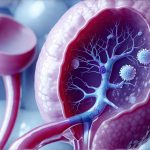The intersection between urology and rheumatology might initially appear distant – one focused on the urinary tract and male reproductive system, the other on joints, muscles, and autoimmune diseases. However, increasing research reveals a surprisingly strong bidirectional relationship. Many systemic inflammatory conditions commonly managed by rheumatologists can manifest with urological symptoms, while certain urological issues may be exacerbated or even triggered by underlying rheumatic diseases. This overlap isn’t merely coincidental; it points to shared immunological pathways, impacting both organ systems and necessitating collaborative care for optimal patient outcomes. Recognizing this interplay is crucial for accurate diagnosis, tailored treatment strategies, and improved quality of life for individuals experiencing these complex conditions.
This emerging field of crossover research challenges traditional disciplinary boundaries in medicine. Historically, urologists and rheumatologists have operated largely independently, focusing on their respective specialties. As our understanding of systemic inflammation deepens, it becomes clear that autoimmune and autoinflammatory processes don’t confine themselves to specific organs. They can impact multiple systems simultaneously, leading to a diverse range of symptoms, some of which present primarily within the urological realm. This requires clinicians to broaden their perspectives, consider alternative diagnoses beyond traditional urological or rheumatological presentations, and embrace a more holistic approach to patient evaluation and management. Furthermore, shared pharmacological interventions are increasingly utilized across both specialties, demanding a greater understanding of potential drug interactions and side effects in this overlapping patient population.
Systemic Inflammatory Diseases & Urological Manifestations
Several rheumatic diseases can directly impact the urinary tract and male reproductive system. Rheumatoid arthritis (RA), for example, isn’t just a disease of joint inflammation; it can lead to interstitial cystitis-like symptoms, including pelvic pain, urgency, and frequency. This is likely due to systemic inflammation affecting the bladder wall or potentially through autoimmune mechanisms targeting the bladder itself. Similarly, systemic lupus erythematosus (SLE) – a chronic autoimmune disease – commonly affects the kidneys, leading to lupus nephritis, which can range from mild proteinuria to full-blown renal failure. The glomerulonephritis associated with SLE often requires immunosuppressive therapy managed in collaboration between rheumatology and nephrology, but urologists play a role in managing related urinary symptoms and complications.
Ankylosing spondylitis (AS), primarily known for its impact on the spine, can also present with urological manifestations. Sacroiliac joint inflammation common in AS can lead to referred pain mimicking bladder issues, while chronic inflammation may contribute to urethral strictures or other urinary tract problems. Moreover, men with AS are at increased risk of erectile dysfunction, potentially linked to inflammatory changes affecting pelvic nerves and blood flow. The use of nonsteroidal anti-inflammatory drugs (NSAIDs) – a mainstay in AS treatment – can also have implications for kidney function, necessitating careful monitoring by both rheumatologists and urologists.
Beyond these common rheumatic diseases, conditions like Sjögren’s syndrome – an autoimmune disorder causing dryness of mucous membranes – frequently leads to urinary frequency, urgency, and even incontinence due to impaired bladder sensation and reduced fluid absorption in the kidneys. Vasculitis, a group of disorders characterized by inflammation of blood vessels, can affect renal arteries leading to hypertension or kidney failure, again requiring coordinated care between specialties. Recognizing these connections is vital for accurate diagnosis; a patient presenting with unexplained urinary symptoms should be evaluated not only for urological causes but also for potential underlying systemic inflammatory conditions.
The Role of Immunosuppression & Urological Complications
Immunosuppressive therapies are often the cornerstone of treatment for rheumatic diseases, aimed at reducing inflammation and preventing disease progression. However, these medications can have significant implications for urological health. Drugs like methotrexate, cyclophosphamide, and azathioprine – commonly used in autoimmune disorders – can increase susceptibility to urinary tract infections (UTIs) due to their immunosuppressive effects weakening the immune system’s ability to fight off infection. This is particularly concerning in patients with underlying bladder dysfunction or anatomical abnormalities predisposing them to UTIs.
Furthermore, certain immunosuppressants can directly affect kidney function, potentially leading to acute kidney injury or chronic renal insufficiency. Regular monitoring of renal function is therefore critical in patients on these medications. Cyclophosphamide, for instance, can cause hemorrhagic cystitis – inflammation and bleeding within the bladder – requiring prompt intervention and potential modification of treatment regimens. It’s important to note that managing immunosuppression in the context of urological complications requires a delicate balance: reducing medication dosage may alleviate urological symptoms but risks disease flare-ups, while continuing full doses might exacerbate urinary problems.
The management of these complications necessitates close collaboration between rheumatologists and urologists. Adjusting immunosuppressive regimens based on renal function tests and UTI frequency, utilizing prophylactic antibiotics when appropriate, and optimizing bladder health through lifestyle modifications are all essential components of comprehensive care. The development of newer, more targeted immunosuppressants with fewer side effects is also promising in reducing the urological burden associated with these treatments.
Urological Conditions & Rheumatic Disease Risk
The relationship isn’t unidirectional. Emerging evidence suggests that certain chronic urological conditions might be associated with an increased risk of developing rheumatic diseases or exacerbating existing ones. For example, patients with chronic prostatitis/chronic pelvic pain syndrome (CP/CPPS) often exhibit elevated levels of inflammatory markers in their prostatic fluid and urine, suggesting a potential link to autoimmune processes. Some studies have shown a higher prevalence of autoantibodies – antibodies that attack the body’s own tissues – in men with CP/CPPS compared to healthy controls.
Similarly, interstitial cystitis/bladder pain syndrome (IC/BPS) is increasingly recognized as having an inflammatory component, and there’s growing research exploring potential autoimmune mechanisms underlying the condition. The chronic pelvic pain and urinary symptoms associated with IC/BPS can significantly impact quality of life, and some patients may develop secondary rheumatic manifestations like fibromyalgia or myofascial pain syndrome. While a direct causal relationship hasn’t been definitively established, these associations suggest that inflammation within the urological system might contribute to systemic autoimmune responses in susceptible individuals.
The precise mechanisms driving this connection remain under investigation, but potential explanations include: – Microbial infections triggering an immune response that cross-reacts with bladder tissues and other organs – Molecular mimicry where antigens from bacteria or viruses resemble self-antigens leading to autoimmunity – Gut dysbiosis influencing systemic inflammation and autoimmune disease development. Further research is needed to unravel these complexities and identify individuals at risk, potentially allowing for early intervention and preventive strategies.
Biomarkers & Future Research Directions
Identifying reliable biomarkers that can predict the overlap between urology and rheumatology would be a significant advancement in patient care. Currently, there’s no single biomarker that definitively links these two specialties, but several candidates are being investigated. C-reactive protein (CRP) and erythrocyte sedimentation rate (ESR) – commonly used to assess inflammation – can be elevated in both urological conditions with inflammatory components and rheumatic diseases. However, these markers lack specificity as they can rise in response to various types of inflammation.
More promising biomarkers include specific autoantibodies associated with autoimmune disorders, such as antinuclear antibodies (ANA) and anti-CCP antibodies found in rheumatoid arthritis. Measuring levels of cytokines – signaling molecules involved in the immune system – like TNF-alpha, IL-6, and IL-17 in urine or serum could also provide valuable insights into inflammatory processes occurring within the urinary tract and systemic circulation. Additionally, research is exploring the role of the gut microbiome in mediating the interplay between urological conditions and rheumatic diseases. Analyzing microbial composition in stool samples might reveal differences between patients with and without autoimmune manifestations.
Future research should focus on large-scale studies to validate these biomarkers and develop predictive models that can identify individuals at risk of developing crossover complications. Advanced imaging techniques, such as MRI and PET scans, could also help visualize inflammation within the urinary tract and assess its relationship to systemic inflammatory processes. Ultimately, a deeper understanding of the underlying mechanisms driving this overlap will pave the way for targeted therapies and personalized treatment strategies tailored to individual patient needs. This requires continued collaboration between urologists, rheumatologists, immunologists, and other specialists to bridge disciplinary gaps and advance our knowledge in this exciting area of medical research.





















